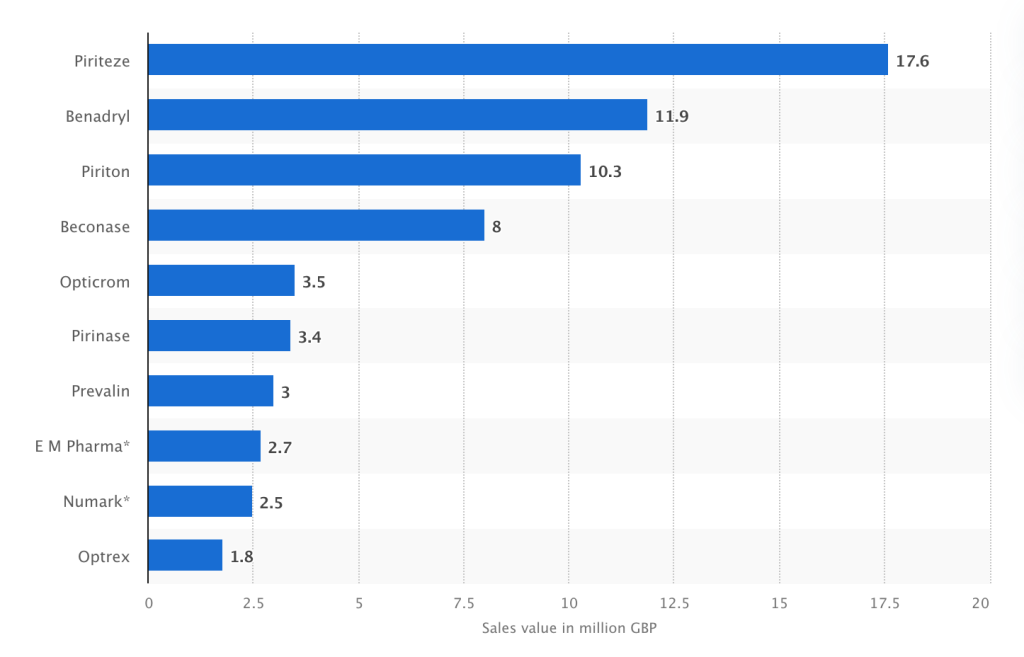-
NHS
-
Oldham Services
-
Shop
-
Help & Advice
When hay fever season comes around, one in four people in the UK suffers from allergic rhinitis, which equates to around 16 million people. The widespread exposure highlights the significant impact of hay fever on the population as individuals grapple with the unpleasant symptoms triggered by rising pollen counts.
From sneezing and itchy eyes to nasal congestion and respiratory distress, the effects of a seasonal allergic reaction can disrupt daily life for millions. This can be seen from the increasing demand for effective allergy treatments during these months.
At Click2Pharmacy, we prioritise clear and open conversations about health issues, so we have analysed the latest statistics on hay fever prevalence and prescription trends in the United Kingdom. Our insights are based on data from Google Trends and the NHS.
We explore all our hay fever statistics in depth below, but if you’re looking for a quick overview, here’s what we found:
Hay fever has long been a familiar affliction for the people of the United Kingdom. For decades, the onset of spring and summer has brought about the familiar symptoms of this seasonal allergy.
Over time, the prevalence of hay fever in the UK has changed, showing changes in environmental factors, lifestyle, and medical understanding. In recent decades, the number of people affected by this allergic condition has risen significantly compared to previous periods.
The frequency of hay fever in the UK is closely tied to the country’s pollen seasons. The UK pollen season has three distinct but overlapping types of pollen phases: tree pollen from March to May, grass pollen from May to July (peak in June and July), and weed pollen from June to August.
The seasonal pattern of pollen exposure means that many individuals in the UK face an extended period of potential allergy symptoms, as different types of pollen are released at various times throughout the spring and summer months. The prevalence of hay fever is exceptionally high during the grass pollen season, as nine out of ten hay fever sufferers in the UK are allergic to this allergen.
As temperatures have risen and pollen seasons have shifted, so have the timing and intensity of hay fever symptoms. The tree and grass pollen seasons may start even earlier, potentially causing hay fever symptoms as early as January or February for some sufferers. The shift in the timing and duration of pollen exposure could have significant implications for the management and treatment of hay fever in the UK.
People of all ages can develop hay fever, but it affects around 26% of adults in the UK. However, 1 in 6 children will experience hay fever by the age of 6.
According to Children’s Allergies, hay fever has been found to have a significant impact on students in the UK, especially during the critical period of GCSE and A-level exams, which coincides with the peak pollen season. Due to their symptoms, children who suffer from hay fever are more likely to achieve lower marks.
Parents often struggle to treat their children’s symptoms, as sedating antihistamines can impact daytime fatigue and cognitive function. This is why 88% of children deal with sleep problems during peak pollen season, which can affect their academic performance.
Google Trends has found a rise in related search queries for ‘hay fever treatment for toddlers’ that reflects concerns among parents about how best to alleviate their children’s symptoms.
trends.embed.renderExploreWidget(“RELATED_QUERIES”, {“comparisonItem”:[{“keyword”:”hay fever treatment”,”geo”:”GB”,”time”:”today 12-m”}],”category”:0,”property”:””}, {“exploreQuery”:”geo=GB&q=hay%20fever%20treatment&hl=en-GB&date=today 12-m”,”guestPath”:”https://trends.google.com:443/trends/embed/”});
Source: Google Trends
There is no evidence as to why the diagnosis of hay fever is increasing, particularly in children in the UK. It could be argued that, as children are spending less time outside, their immune systems are no longer becoming exposed to high levels of pollen earlier on in life. This means their immune systems aren’t able to fight hay fever as they get older.
trends.embed.renderExploreWidget(“GEO_MAP”, {“comparisonItem”:[{“keyword”:”hay fever treatment”,”geo”:”GB”,”time”:”today 12-m”}],”category”:0,”property”:””}, {“exploreQuery”:”geo=GB&q=hay%20fever%20treatment&hl=en-GB&date=today 12-m”,”guestPath”:”https://trends.google.com:443/trends/embed/”});
Source: Google Trends
Using an analysis of the search term ‘hay fever treatment’ from Google Trends, we have found that you are more likely to search this term if you live in Wales than any other country in the UK. This could be due to the higher concentrations of grass pollen that come from the plants there, which peaks in the summer months. England then follows Wales, then Northern Ireland, and then Scotland.
Allergic Rhinitis is also a risk factor for the development of asthma, especially in children. More than 40% of patients with AR have asthma or have an increased risk of developing asthma, as well as suffering from asthma attacks.
2% of the population also experience food allergies in relation to their hay fever, also known as oral allergy syndrome. People with a pollen food allergy can experience swelling and itching in the throat, mouth and ears when they consume fruits, vegetables and nuts that contain pollen.
People with eczema are also more likely to experience hay fever. Atopic eczema occurs in childhood and is associated with a family history of conditions like hay fever and asthma. Hay fever does not cause eczema, but it can cause flare-ups and may become worse during the summer months.
Despite 1 in 4 people having hay fever in the UK, around 49% of people in the UK reported suffering from hay fever symptoms.
According to the NHS, the most common symptoms of hay fever are:
Using Google Trends, we found that people have been searching for other rare symptoms of hay fever, such as nose bleeds, shortness of breath and the suddenness of developing hay fever in adulthood.
GP consultation rates for hay fever rose by 260% during the period 1971-1991 and have been steadily climbing since. According to the NHS, in June 2023, the number of visitors to their site looking for advice on hay fever treatment tripled to 122,650 in a week. This coincides with the rising pollen levels and the influx in sales of over-the-counter medicines for hay fever.
Find more statistics at  Statista
Source: Statista
The sales of over-the-counter antihistamines were steady until 2013-2014 when they jumped substantially. In 2014, parts of the world experienced a ‘pollen vortex’ due to prolonged and severe winter weather. This delayed the normal flowering and pollen release of many trees and meant that when warmer spring temperatures finally arrived, the trees all bloomed at once, releasing a massive amount of pollen into the air. The wet and stormy winter weather helped trees and plants grow more vigorously, increasing pollen production.
Due to increasing pollen levels, OTC hay fever remedies sales have been climbing rapidly, with sales over double in 2023 than in 2009. This could be due to more awareness of the condition and the ease in accessibility of over-the-counter treatments.

Source: Statista
The most used hay fever treatments in the UK are Piriteze and Benadryl. These are over-the-counter antihistamines accessible from any pharmacy or supermarket, which is why they are more commonly used than prescription treatments.
The most used prescription treatment from a GP or pharmacist is Beconase, a steroid-based nasal spray. This is stronger than over-the-counter nasal sprays, and patients may start with the more accessible and convenient options before moving to the prescription-strength treatment if necessary.
With many struggling to see results in hay fever tablets and over-the-counter remedies, many are turning to other forms of treatment. In June 2023, the term ‘hay fever injection’ was searched over 110,000 times in one month. This is currently not available on the NHS and is not licensed in the UK.
The most common search trends relating to hay fever are about the symptoms and how to treat them. This indicates that many people are either newly experiencing symptoms or unsure if they are associated with hay fever. The focus on symptoms shows that many need help differentiating hay fever from other similar conditions like colds or COVID-19.
People are often searching for an ‘immediate’, ‘fast’ or ‘permanent cure’ for hay fever, which reflects a desire for quick and long-lasting relief. This urgency suggests that hay fever significantly impacts the quality of life, urging sufferers to seek solutions for rapid relief.
There has also been an increase in searches for homoeopathic or homemade remedies for hay fever. This trend may be due to people looking for natural alternatives or needing more than conventional treatments.
Allergy sufferers experience hay fever seasonally, and data suggests that the number of cases is increasing. Although the specific reasons for this trend are still unclear, researchers are actively exploring why. Meanwhile, those affected are buying more treatments to help control their symptoms.

